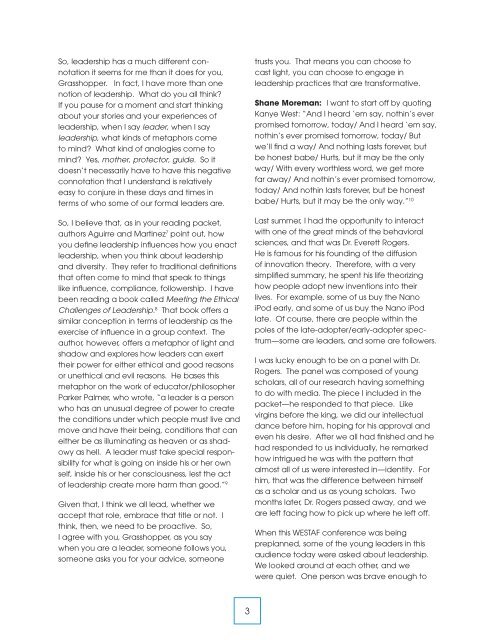The New Face of Arts Leadership in the West - westaf - The Western ...
The New Face of Arts Leadership in the West - westaf - The Western ...
The New Face of Arts Leadership in the West - westaf - The Western ...
You also want an ePaper? Increase the reach of your titles
YUMPU automatically turns print PDFs into web optimized ePapers that Google loves.
So, leadership has a much different connotation<br />
it seems for me than it does for you,<br />
Grasshopper. In fact, I have more than one<br />
notion <strong>of</strong> leadership. What do you all th<strong>in</strong>k?<br />
If you pause for a moment and start th<strong>in</strong>k<strong>in</strong>g<br />
about your stories and your experiences <strong>of</strong><br />
leadership, when I say leader, when I say<br />
leadership, what k<strong>in</strong>ds <strong>of</strong> metaphors come<br />
to m<strong>in</strong>d? What k<strong>in</strong>d <strong>of</strong> analogies come to<br />
m<strong>in</strong>d? Yes, mo<strong>the</strong>r, protector, guide. So it<br />
doesn’t necessarily have to have this negative<br />
connotation that I understand is relatively<br />
easy to conjure <strong>in</strong> <strong>the</strong>se days and times <strong>in</strong><br />
terms <strong>of</strong> who some <strong>of</strong> our formal leaders are.<br />
So, I believe that, as <strong>in</strong> your read<strong>in</strong>g packet,<br />
authors Aguirre and Mart<strong>in</strong>ez 7 po<strong>in</strong>t out, how<br />
you def<strong>in</strong>e leadership <strong>in</strong>fluences how you enact<br />
leadership, when you th<strong>in</strong>k about leadership<br />
and diversity. <strong>The</strong>y refer to traditional def<strong>in</strong>itions<br />
that <strong>of</strong>ten come to m<strong>in</strong>d that speak to th<strong>in</strong>gs<br />
like <strong>in</strong>fluence, compliance, followership. I have<br />
been read<strong>in</strong>g a book called Meet<strong>in</strong>g <strong>the</strong> Ethical<br />
Challenges <strong>of</strong> <strong>Leadership</strong>. 8 That book <strong>of</strong>fers a<br />
similar conception <strong>in</strong> terms <strong>of</strong> leadership as <strong>the</strong><br />
exercise <strong>of</strong> <strong>in</strong>fluence <strong>in</strong> a group context. <strong>The</strong><br />
author, however, <strong>of</strong>fers a metaphor <strong>of</strong> light and<br />
shadow and explores how leaders can exert<br />
<strong>the</strong>ir power for ei<strong>the</strong>r ethical and good reasons<br />
or unethical and evil reasons. He bases this<br />
metaphor on <strong>the</strong> work <strong>of</strong> educator/philosopher<br />
Parker Palmer, who wrote, “a leader is a person<br />
who has an unusual degree <strong>of</strong> power to create<br />
<strong>the</strong> conditions under which people must live and<br />
move and have <strong>the</strong>ir be<strong>in</strong>g, conditions that can<br />
ei<strong>the</strong>r be as illum<strong>in</strong>at<strong>in</strong>g as heaven or as shadowy<br />
as hell. A leader must take special responsibility<br />
for what is go<strong>in</strong>g on <strong>in</strong>side his or her own<br />
self, <strong>in</strong>side his or her consciousness, lest <strong>the</strong> act<br />
<strong>of</strong> leadership create more harm than good.” 9<br />
Given that, I th<strong>in</strong>k we all lead, whe<strong>the</strong>r we<br />
accept that role, embrace that title or not. I<br />
th<strong>in</strong>k, <strong>the</strong>n, we need to be proactive. So,<br />
I agree with you, Grasshopper, as you say<br />
when you are a leader, someone follows you,<br />
someone asks you for your advice, someone<br />
trusts you. That means you can choose to<br />
cast light, you can choose to engage <strong>in</strong><br />
leadership practices that are transformative.<br />
Shane Moreman: I want to start <strong>of</strong>f by quot<strong>in</strong>g<br />
Kanye <strong>West</strong>: “And I heard ‘em say, noth<strong>in</strong>’s ever<br />
promised tomorrow, today/ And I heard ‘em say,<br />
noth<strong>in</strong>’s ever promised tomorrow, today/ But<br />
we’ll f<strong>in</strong>d a way/ And noth<strong>in</strong>g lasts forever, but<br />
be honest babe/ Hurts, but it may be <strong>the</strong> only<br />
way/ With every worthless word, we get more<br />
far away/ And noth<strong>in</strong>’s ever promised tomorrow,<br />
today/ And noth<strong>in</strong> lasts forever, but be honest<br />
babe/ Hurts, but it may be <strong>the</strong> only way.” 10<br />
Last summer, I had <strong>the</strong> opportunity to <strong>in</strong>teract<br />
with one <strong>of</strong> <strong>the</strong> great m<strong>in</strong>ds <strong>of</strong> <strong>the</strong> behavioral<br />
sciences, and that was Dr. Everett Rogers.<br />
He is famous for his found<strong>in</strong>g <strong>of</strong> <strong>the</strong> diffusion<br />
<strong>of</strong> <strong>in</strong>novation <strong>the</strong>ory. <strong>The</strong>refore, with a very<br />
simplified summary, he spent his life <strong>the</strong>oriz<strong>in</strong>g<br />
how people adopt new <strong>in</strong>ventions <strong>in</strong>to <strong>the</strong>ir<br />
lives. For example, some <strong>of</strong> us buy <strong>the</strong> Nano<br />
iPod early, and some <strong>of</strong> us buy <strong>the</strong> Nano iPod<br />
late. Of course, <strong>the</strong>re are people with<strong>in</strong> <strong>the</strong><br />
poles <strong>of</strong> <strong>the</strong> late-adopter/early-adopter spectrum—some<br />
are leaders, and some are followers.<br />
I was lucky enough to be on a panel with Dr.<br />
Rogers. <strong>The</strong> panel was composed <strong>of</strong> young<br />
scholars, all <strong>of</strong> our research hav<strong>in</strong>g someth<strong>in</strong>g<br />
to do with media. <strong>The</strong> piece I <strong>in</strong>cluded <strong>in</strong> <strong>the</strong><br />
packet—he responded to that piece. Like<br />
virg<strong>in</strong>s before <strong>the</strong> k<strong>in</strong>g, we did our <strong>in</strong>tellectual<br />
dance before him, hop<strong>in</strong>g for his approval and<br />
even his desire. After we all had f<strong>in</strong>ished and he<br />
had responded to us <strong>in</strong>dividually, he remarked<br />
how <strong>in</strong>trigued he was with <strong>the</strong> pattern that<br />
almost all <strong>of</strong> us were <strong>in</strong>terested <strong>in</strong>—identity. For<br />
him, that was <strong>the</strong> difference between himself<br />
as a scholar and us as young scholars. Two<br />
months later, Dr. Rogers passed away, and we<br />
are left fac<strong>in</strong>g how to pick up where he left <strong>of</strong>f.<br />
When this WESTAF conference was be<strong>in</strong>g<br />
preplanned, some <strong>of</strong> <strong>the</strong> young leaders <strong>in</strong> this<br />
audience today were asked about leadership.<br />
We looked around at each o<strong>the</strong>r, and we<br />
were quiet. One person was brave enough to<br />
3


